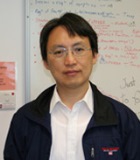Dr Yao, Kwok Ming 丘國明
Dr Yao, Kwok Ming 丘國明
FOXM1 and regulation of cell proliferation and survival of cancer and stem cells. Dr. Yao was one of the co-discoverers of FOXM1 when he was a postdoctoral fellow at Genetics Institute, Inc. (Yao et la., 1997). His lab first demonstrated that FOXM1 over-expression stimulates cyclin B1 expression and enhances progression through the G2/M phase of the cell cycle (Leung et al., 2001). FOXM1 was later shown by Dr. Yao’s lab to be regulated by MAPK signaling, strongly indicating a pivotal role played by FOXM1 in mediating the growth promoting effect of mitogens (Ma et al., 2005). Further, Dr. Yao and his collaborators discovered that FOXM1 regulates the transcription of the estrogen receptor α in breast cancer cells (Madureira et al., 2006) and that FoxM1 counteracts oxidative stress-induced senescence and stimulates Bmi-1 expression in MEFs (Li et al., 2008). Recently, Dr. Yao’s lab presented evidence to support the hypothesis that the b isoform, which is frequently over-expressed in cancers, represents a more active form of FOXM1 (Lam et al., 2013).Furthermore, Dr. Yao has collaborated with Dr. David Chan (co-I) and Prof. Ngan, clinical colleagues at the Department of Obstetrics and Gynecology, HKU, to show that FOXM1 is involved in the regulation of cervical cancer progression (Chan et al., 2008) and the migration/invasion of ovarian cancer cells (Lok et al., 2011).
PDZD2/sPDZD2 and regulation of Hedgehog (Hh) signaling. In a screen for pancreatic beta cell-enriched genes at Genetics Institute, Inc., Dr. Yao also discovered PDZD2 (previously named PIN-1 in Thomas et al., 1999). Interestingly, PDZD2 was found to be proteolytically cleaved at its C terminus to generate a secreted protein (named sPDZD2) containing two PDZ domains (Yeung et al., 2003). sPDZD2 exerted insulinotropic effects on human pancreatic progenitor cells and INS-1E cells (Leung et al., 2009; Suen et al., 2008; Ma et al., 2006). Subsequently, PDZD2/sPDZD2 was found to be expressed during early mouse embryonic development. Mapping of a Brachydactyly A1 disease locus close to 5p13 where human PDZD2 is localized led to study of the regulatory role of sPDZD2 during limb and digit development. Importantly, sPDZD2 was shown to express in close proximity to Hh-expressing tissues and functional studies (in chick neural tube, Gli reporter cell line and mouse model) point to sPDZD2 being a novel negative regulator of Hh signaling (Tsui et al., in preparation).
| Awardees | Award Date | Honours / Awards / Prizes | Category |
|---|---|---|---|
Wong, SY | 2017-05-01 | Best Paper Award (3rd Prize), International Conference of Vision and Eye Research 2017: KB Woo Fund | Research Achievement |
Wong, SY | 2017-03-01 | Young Investigator Award for the Oral Category, 12th International Symposium on Healthy Aginh: Research Cnetre of Heart, Brain, Hormone & Healthy Aging, The University of Hong Kong | Research Achievement |
Wong, SY | 2017-02-01 | ARVO-Asia 2017 Travel Grant: ARVO-Asia | Research Achievement |
Ho, JWY | 2015-10-01 | Teaching Development Grant: The University Of Hong Kong | Teaching Accomplishment |
Ho, JWY | 2014-10-01 | Teaching Development Grant: The University Of Hong Kong | Teaching Accomplishment |
WONG, Siu Yin | 2014-09-01 | Runner-up in Visual Sciences, The 3rd Li Ka Shing Foundation International Research Student Forum, Sep 25, 2014: Joint Shantou International Eye Center, The Chinese University of Hong Kong | Research Achievement |
| Term Period | Position | Professional Societies |
|---|---|---|
| Since 2012 | Regular member | International Society of Stem Cell Research |
| Since 2008 | Regular member | American Society for Biochemistry and Molecular Biology (ASBMB) |
| Since 1992 | Regular member | American Association for the Advancement of Science |
| Since 1997 | Regular member | The Genetics Society of America |
Are You Missing Publications, Invited Lectures? Click Me.


